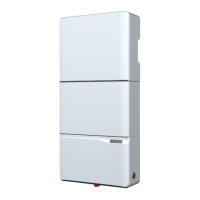14
2.2 Data evaluation and communication
The integrated interface, processing and communication of the device enables easy operation of
the solar inverter. Monitoring of the operational status and signaling of operational failures are capa-
ble of being called up over the interface. The data interfaces enable the downloading of data which
can be evaluated with the aid of a PC system and allow continuous recording of operating data.
The best way of accessing this functionality is via a monitoring system connected to your inverter.
2.3 Technical structure of the solar inverter
The photovoltaic voltage is adjusted so that the maximum power output of the PV modules is also
achieved with dierent solar irradiation levels and temperatures (MPP-Tracking). These inverters
have a wide MPP range suit for variety of PV modules by a variety of manufacturers. Measures
must be taken to ensure that the maximum no-load voltage is never exceeded. Please note that
the maximum no-load voltage will occur at the lowest temperatures anticipated. You will nd more
detailed information about temperature dependency in the datasheet of the PV modules.
The high-quality aluminum casing corresponds to protection degree NEMA Type 4 and is protected
by an anti-corrosion nish. The heat sink on the Delta solar and energy storage inverter is designed
in such a way that operation of the inverter is possible at ambient temperatures from -22°F to
+113°F (-30°C to +45°C) at full power and optimal eciency for either 240 Vac or 208 Vac AC grids.
Metal ns designed into the rear side of the inverter chassis are used to dissipate heat and protect
the unit. An internal temperature control protects the interior of the device. In case of high ambient
temperatures, the maximum transferable power is limited.
The inverter is controlled by microcontrollers which provide interface communication and the values
and messages via APP or cloud.
AC grid monitoring is done by an independent dedicated micro controller set up to meet the require-
ments of UL 1741,UL1741 SB / IEEE 1547. This enables a connection of the solar inverter to the
in-house grid.
Operator protection requirements are met by electrically isolating the grid from the PV modules.
Electrical isolation between the grid and the PV modules is equivalent to basic insulation. Maximum
operator protection is ensured by reinforced isolation between the grid, PV modules, battery and
accessible interfaces (display, RS485 interface ). Relevant standards concerning electromagnetic
compatibility (EMC) and safety are fullled.
The inverter is functional in grid-parallel operation exclusively. An automatically anti-islanding func-
tion, which is accepted by a certication agency, guarantees secure disconnection in case of circuit
isolation or interruptions in power supply and avoids isolated operation.
The DC arc-fault circuit interrupt (AFCI) is integrated into E4_BDI, E6_BDI, E8_BDI and E10_
BDI. It complies the requirement as Type 1 device in UL1699B standard, series arc faults can be
detected.

